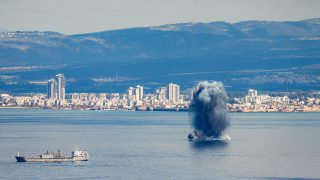While the Hungarian government appears understanding of Russia, the era of Hungaro-Russian friendship, at least on a parliamentary level, has come to an end. “We don’t socialize with representatives from a kind of country that invades another country, and that’s why we won’t form a friendship section with them,” explained a representative to 24.hu regarding the absence of a Hungaro-Russian friendship group. The decision was based on the initiative of the board of the Hungarian group of the Inter-Parliamentary Union (IPU). Four of the six board members are from Fidesz, and the proposal was ultimately made by Fidesz President Mihály Balla, and then had to be approved by the Speaker of the National Assembly, László Kövér. When we tried to reach Balla for the reasons behind this decision, the press office of the Fidesz parliamentary group responded on his behalf:
War is raging between Ukraine and Russia. The Hungarian National Assembly expressed its commitment to peace in an eight-point resolution, condemned Russia’s military aggression, and recognized Ukraine’s right to self-defence. Due to the current situation, the Hungaro-Russian friendship group was not formed.
Currently, 91 parliamentary friendship groups and sections are listed in the Hungarian National Assembly. Any member of parliament can join such a group, and there is no limit on how many groups a member can belong to.
Why is this all worth it? These groups present opportunities to:
- travel and study in the respective partner countries,
- establish relationships with parliamentary representatives and embassies of the respective countries,
- and, in case of an exceptionally ambitious MP, even to attract foreign investors to their constituencies, although the chances of this happening are rather slim regarding for example the Hungaro-Kyrgyz or Hungaro-Rwandan friendship groups.
Up until 2022, the group of Hungaro-Russian friendship had only been absent in the very first cycle. Instead, a Hungaro-CIS (Commonwealth of Independent States, which includes Russia and several other post-Soviet states) friendship group was formed in 1992. However, the Russian group would enjoy unwavering popularity in subsequent cycles, usually operating as one of the largest groups. During the last two cycles, the group was chaired by Fidesz representative Sándor Lezsák, who, when asked about the group’s operation and eventual dissolution, dismissed our inquiries. However, in an interview with our newspaper in June, he still spoke in the present tense about the now-disbanded section:
“I am the chairman of the Hungaro-Russian interparliamentary union. I am deeply shocked by this terrible brother war claiming tens of thousands of lives. But even in this situation, I met with the Russian ambassador and made it clear to him that I had not only signed the eight-point declaration for peace, but also endorsed it.”

However, a former member reported that the Hungaro-Russian group had in truth not been very active:
“We only had one meeting in a span of four years, as nothing would follow the inaugural meeting. However, at that first meeting, even the Russian ambassador was present to deliver a speech. I, for one, did not get to visit Russia, and I don’t know of any trips organized for the members. However, we regularly received invitations to the Victory Day celebration at the embassy,” said the since-retired politician, who requested not to reveal their name.
The path taken by the Hungaro-Ukrainian friendship group, on the other hand, seems to be the polar opposite of that of the Russian association. Such a group did not exist in the previous cycle, but last year, also upon the proposal of Mihály Balla and his team, it was formed under the leadership of Fidesz representative Attila Tilki. Tilki may have been chosen for chairmanship due to his constituency’s proximity to the Ukrainian border. Moreover, he appeared in the news several times in connection to the assistance provided to refugees following the outbreak of the war. On the other hand, Tilki is a rather interesting choice for the role, as he was banned from Ukraine for three years for “interference in Ukrainian internal affairs and undermining Ukrainian national security” in December 2020, although the Ukrainian Security Service did not disclose any details about his alleged activities.
Opposition members have reported to 24.hu that despite the group being formed on paper, it is practically non-functioning, as not even the inaugural meeting has been convened by the chairman since the group’s inception:
“On January 30th this year, we were informed of the establishment of the Hungaro-Ukrainian friendship group, of which I at the same time became the vice-president, even though according to the parliament’s website, the group had already been established in November last year. However, I have not received an invitation to a single meeting so far, and to my knowledge, the group is not functioning,” said Ágnes Vadai, a representative from the Democratic Coalition (DK), to 24.hu.
Tamás Harangozó, a member of the group from the Hungarian Socialist Party (MSZP), is also at a loss regarding why the chairman has not called a single meeting in nearly a year’s time. “The current war could shape the long-term attitude of Ukrainians towards countries that act hostilely towards them. I joined the Ukrainian friendship group to somehow counterbalance the Hungarian government’s pro-Russian policy by at least my own modest means, and to facilitate the friendship between the two countries and thus improve the situation of Hungarians in Transcarpathia,” said Harangozó, who finds it incomprehensible that the chairman is obstructing the group from officially starting its operation. It’s worth noting that the group also includes Fidesz’s Zsolt Németh, the chairman of the Foreign Affairs Committee, and Árpád Potai, the State Secretary for National Policy.

We also tried to reach Attila Tilki to find out why he hasn’t convened the group in nearly a year, but the Fidesz parliamentary group gave us the same reason that we have already cited regarding the case of the Hungaro-Russian friendship group: the Hungaro-Ukrainian friendship section is not holding meetings due to the Russo-Ukrainian war. So it seems that the invader and the invadee fall under the same kind of judgement. As they wrote:
War is raging between Ukraine and Russia. The Hungarian National Assembly expressed its commitment to peace in an eight-point resolution, condemned Russia’s military aggression, and recognized Ukraine’s right to self-defence. Due to the current situation, the Hungaro-Russian friendship group was not formed, and the Hungaro-Ukrainian friendship group is currently not holding meetings.






